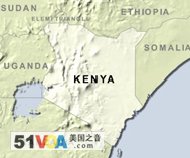Washington, DC
08 May 2009
A Zambian economist is stirring up debate over aid. Dambisa Moyo, formerly with the investment firm Goldman Sachs, argues that financial assistance has created a culture of dependency in Africa and should be cut. She's making her views known on the lecture circuit in the US and Europe and with her new book, called Dead Aid.
The debate comes as activists worry that the global economic crisis could bring a drop in overseas development assistance. According to the OECD (Organization for Economic Cooperation and Development), last year industrialized countries provided 119 billion dollars in overseas assistance to the developing world, with more than 22 billion dollars going to sub-Saharan Africa.
Dambisa Moyo says aid to Africa has failed. In her new book, Dead Aid, Moyo says poverty rates in sub-Saharan Africa have increased over the past 40 years from 11% to 66%. At the same time, donors have given the continent billions of dollars in development funds.
Moyo, a graduate of Oxford and Harvard, says aid harms Africa in a number of ways.
Aid and Governance
In remarks in April
to the Carnegie Council in New York, she said aid raised by international
celebrities and NGOs sometimes help prop up ineffectual leaders. It also relieves
governments of one of their primary duties ?providing services for their
people.
 |
| Economist Dambisa Moyo |
But Moyo says
market mechanisms could also sanction corrupt leaders:"[The markets would
just shut down on them]," she says,"if African governments borrowed money from the
international capital markets and claimed to investors that they were going to
invest it in productive activities to grow the economy and pay back the
interest and the principal but then spent the money on keeping themselves in
private jets or whatever and did not use the money productively."
Aid and Debt
Moyo says
international lenders perpetuate dependency on foreign aid. She says the International Monetary Fund often writes a
country's development policies. In
contrast, IMF officials say they invite
national governments to come up with their own development strategies, which
the institution usually agrees to support.
"Basically," says Moyo, "we end up
in the situation where African governments, even today, are spending about $20
billion in interest payments every year. That money is being spent to keep the
system in place. So you pay a little bit of money to the World Bank and they
re-lend to you. Or you pay a little bit of money to Norway or the United
Kingdom or U.S. aid agencies, and then you get the money back."
Moyo says aid
also feeds conflict. In states without developed private sectors, factions
fight for the only entity that has a pool of cash, the government.
She says aid
also causes inflation: Economists say that aid can drive up exchange rates,
damaging growth by making exports more expensive.
 |
| Kenya |
Taxation With Representation
The economist says
without aid, governments would have to raise taxes by strengthening the private
sector or collect them from private citizens. This, she says, would create an
expectation of accountability on the part of citizens.
In Ethiopia, she says that could be
done by selling phone licenses to companies.
With competition, phone rates would drop. At the same time, the
government could raise revenues by taxing phone calls.
"Ethiopia," she says, "is the
second-largest population in sub-Saharan Africa. Nigeria has about 100 million people.
Ethiopia has about 90 million people. The mobile phone penetration rate is two
percent in Ethiopia, so about two percent of the population has a mobile phone,
compared to the average in Africa, which is about 30 percent -- One in three
Africans has a phone. Compared to
the fact that there are now 30 countries that have over 100 percent mobile
phone penetration rates [meaning people have more than one mobile phone].
"Why am I telling this story? Because we have a lot of evidence now that
mobile phones are very, very important
and they can be very, very influential in terms of providing jobs and
generating an income. I'll give you a specific example.
"In Ghana there is a lot of literature about how a farmer can now
call city A and say, "Listen, I'm in the rural area. If I bring my sack of
corn to you how much are you going to charge?" He could find, "If I
bring it to city A, I'll get paid $20. If I bring it to city B, I'll get paid
$40." Therefore, the farmer can improve his income by taking it to city
B."
 |
"But here we have a government [Ethiopia] with 90 million people ?.that is also one of the governments that is at the G20 asking for bailout money.
"Why am I bringing this up? Because why would it be so difficult for the government to sell off the license, earn a one-off large fee, but also maybe even put on a tariff so they can continue to earn a usage fee from people using the mobile phones. [They could] provide a real chance for its citizens to actually start to do business, start to be able to trade, and generate incomes for them to stand on their own two feet.
This is a classic example of the type of attitude that I think pervades the African continent.
"Perhaps it is no surprise that 97 percent of the budget in Ethiopia is aid-based. It shows a lack of innovation. There is a lack of any effort being paid to try and wean the country off of aid."
Moyo says governments could raise money from issuing bonds, particularly on the capital-rich markets in China and the Middle East.
The Evolution of Aid
 |
Many credit changes with lifting African growth rates to over seven percent per year, reversinga decade of decline.
Moyo is not impressed:
"All the positive things we've seen in Africa in the past 5-10 years," she says, "have been in spite of aid, not because of it. We will never be able to strip out the commodity effect ?the boom which has been huge impetus for growth numbers in recent times. My view on aid is that it is incredibly destructive and long term will not create jobs, alleviate poverty or spur growth. I have not heard from anyone advocate aid to say it is generating jobs."
In Defense of Targeted Support
But some economists say aid linked to the adoption of free-market policies has increased exports -- and employment.
Development economist Paul Collier writes that aid has added about one percentage point to the annual growth of the "the bottom billion." Without aid, he says, the poor would have become poorer.
As for claims that aid leads conflict, Collier writes that half of all civil wars are post-conflict situations and that aid helps boost growth rates in post conflict situations.
Sharing that view is Liberian president Ellen-Johnson-Sirleaf. She has said reducing aid would slow private-sector growth, poverty reduction, and even peace. She says it's better for wealthy countries to fund poorest now, since it would be less than paying for peacekeeping operations later.
Shanta Devarajan is the chief economist of the Africa region at the World Bank.
 |
| Shanta Devarajan |
Others note that since the end of the Cold War, aid has been used more effectively. In some cases, donors channel aid through NGOs rather than corrupt or inefficient bureaucracies. The US Government's Millennium Challenge Accounts targets countries with a record of good economic management.
Moyo says she supports the efforts of the International Monetary Fund in the short term to help African countries withstand the global financial downturn. Over the long-term, however, she wants Africa to better ways of financing development.
Economists say if the global downturn leads to cuts in assistance, Moyo's ideas may be put to the test.
|
|
|
We'd like to hear what you have to say. Let us know what you think of
this report and other news and features on our website. Email your views
about what is happening in Africa to: africa@voanews.com. Please
include your name and phone number if you would like us to include your
comments on our programs. Or, telephone us and leave a message. In the US, call: (202) 205-9942.
After you hear the VOA greeting, press the number "30" and leave your opinion. We
may use it on our daily broadcasts. |